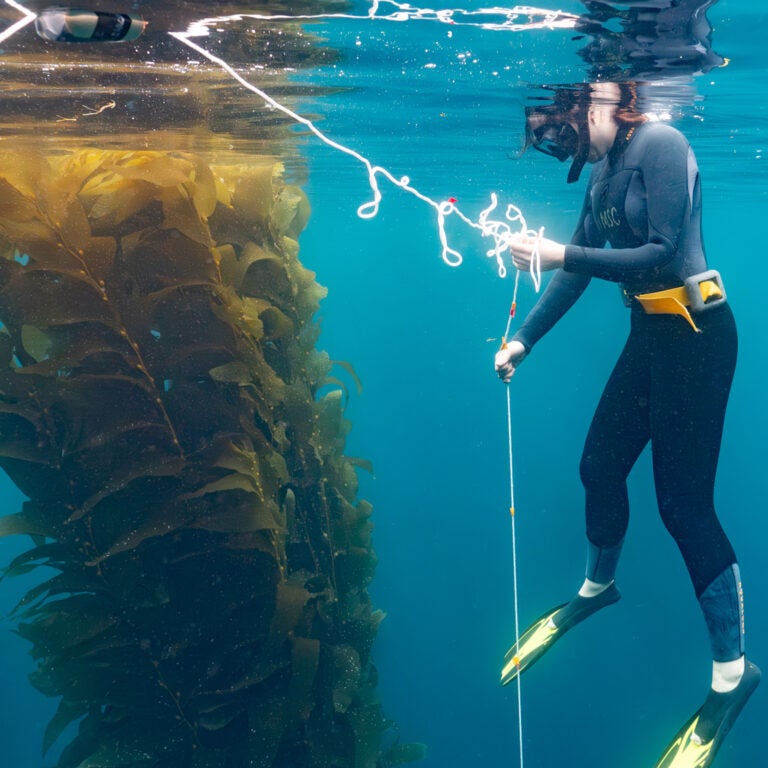Connect to the Planet and Your Peers
Join us for a month filled with once-in-a-lifetime, immersive learning experiences centered on urban oceans!
Courses focus on understanding and solving issues in the San Pedro Channel, a unique ocean environment off the coast of one of the world’s busiest port cities. Everything takes place at the Wrigley Marine Science Center, our incredible living laboratory on Santa Catalina Island.
Applications for Maymester 2025 are now closed. To be notified when Maymester 2026 opens for registration, complete the interest form below.
How it Works
All Wrigley Institute Maymester students spend the full four weeks on Catalina Island. In addition to participating in their core classes, students engage in a variety of interdisciplinary activities designed for the whole group.
Covering the social and natural sciences and the humanities, opportunities include problem-solving sessions, field research, recreation, and special events designed to train students in environmental leadership.
Registration for Maymester 2025 is now closed. For more information about Maymester generally, watch the video below, read our FAQ, or contact Hannah Maryanski Kiszla (maryansk@usc.edu). For information about the types of courses usually offered through this Maymester, see the Maymester 2025 course list at the bottom of this page.

A Learning Experience Like No Other
Five classes. More than 50 students. One incredible island. The USC Wrigley Institute Maymester is a learning experience like no other. Hear directly from students and faculty why our Catalina Residential College is a once-in-a-lifetime chance to immerse yourself in environmental and sustainability education.
Dive into Maymester
Maymester Courses
See the course descriptions below for information on the types of learning opportunities usually available through this program. Most courses repeat each year, and each course carries a full semester of credit for one month of study.
2025 Dates: Monday, May 19-Friday, June 13
Cost: Maymester is included in the spring semester course load and tuition, but this experience has out-of-pocket costs associated with room and board on Catalina Island.
Most financial aid is transferable to Maymesters. However, we strongly encourage you to contact the USC Financial Aid Office to confirm the details of your aid package.
Applications for Maymester 2025 are now closed.
-
Instructors: John Heidelberg (jheidelb@usc.edu) and Eric Webb (eawebb@usc.edu)
Discover how microbes affect not only your health but also the health of our planet, and how anthropogenic influences affect them in return. Aquatic microbiology brings together many different fields of science, including microbial biology, ecology, biochemistry, genomics, bioinformatics, and molecular biology. This deep-immersion course cross-trains students to work and think in many fields, and to apply their knowledge toward an understanding of natural cycles and human impacts along our coastlines. Due to WMSC’s unique setting, students will spend plenty of time in the field getting up-close and personal with the microbial world.
-
Instructors: Karla Heidelberg (kheidelb@usc.edu) and Noelle Held (nheld@usc.edu)
This course is designed to introduce students to the study of coastal marine environments and to guided, independent research in marine ecosystems. During the class, students will learn how to use scientific methodology to evaluate global environmental issues, including topics related to human impacts on coastal environments, watershed interactions, and ecosystem function. Students will use authentic research sampling equipment, sampling methodology, and analysis methods for sites on and around the Wrigley Marine Science Center on Catalina Island. One of the highlights of this class will be an oceanographic training cruise where students will conduct field sampling aboard a working research vessel.
-
Instructor: David Ginsburg (dginsbur@usc.edu)
The purpose of this course is to introduce students to field skills and ecosystem management tools used to investigate complex human-environmental problems in coastal areas. Students will be provided with active learning opportunities to work and learn in coastal environments (both above and below the water), and to gain a better understanding of the interdisciplinary complexities of implementing ecosystem management strategies in a real landscape. At the end of the course, students will present a summary of their active learning projects to gain feedback on their results and outcomes.
-
Instructor: Sean Fraga (sfraga@usc.edu)
In this class, we will use Pimu Catalina Island to explore humanity’s long history with coastal environments. Key themes in our course will include ancient human migration, European exploration and imperialism, environmental colonialism, labor, leisure and tourism, and technology and the environment. Students will engage in original historical research, using narratives, charts, newspapers, photographs, and other archival sources to uncover, understand, interpret, and communicate key stories about the island’s past. In doing so, students will both gain experience with archival research methods and develop insight into how environmental conditions shape and are shaped by human societies over time.
